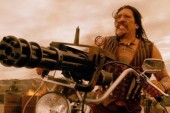
All Images: JJ Thompson, for CBC’s George Stromboulopoulos Tonight (the interview is set to air Thursday June 7 at 11:05 p.m.).
The release of any David Cronenberg movie qualifies as a national event in Canada, serving up the next chapter in the career of our country’s most beloved, intellectual, and perverse filmmaker. So, it should come as no surprise that his latest feature Cosmopolis caused plenty of ballyhoo Monday night, at its traffic-halting Toronto red carpet premiere. Of course, there was perhaps a little extra hubbub this time with the film’s star Robert Pattinson bringing along a crowd of young girls who he ushered into puberty through the Twilight series (no word yet if co-star Paul Giamatti also attracted his own band of squealing fangirls, but you never know – Editor’s Note: This is a thing. We have a 25-year-old Paul Giamatti fangirl on staff).
Of course, the film itself is hardly tween fantasy, but the latest Cronenberg headtrip with a welcomingly detached turn from the heartthrob lead. A particularly faithful adaptation of Don DeLillo’s acclaimed novel, Cosmopolis weaves the tale of a young Wall Street billionaire’s (Pattinson) 24-hour odyssey across New York City in a limousine, as the city erupts in its usual chaos. Full of pit stops with various friends and acquaintances, the film depicts the hollow, cold, and isolated world of a man with such wealth on the day he commits financial suicide, and is possibly murdered by an impoverished admirer/stalker (Giamatti, obviously).
The Standard was invited to a press event on the day of the premiere to probe into the genesis of the project with its creators.
Though Cronenberg is a personal filmmaker with a distinct voice, Cosmopolis is one of his few adaptations from an acclaimed novelist. Dom DeLillo can now be added to a list including the likes of William S. Burroughs and J.G. Ballard as an author to get the Cronenberg treatment, and it’s possibly his most faithful adaptation.
“Some people think that I have a whole checklist of things that I look for in a project and I don’t,” explained Cronenberg. “Certainly the whole idea of filming unfilmmable novels is not in my head at all. I think they’re filmable, that’s why I film them. It’s not as if it’s a challenge I’m looking for or anything like that. On the contrary the easier it is to do it, the happier I am. I’m fairly lazy that way and the thing is that a lot of screenwriting is really abysmal. Screenwriting is completely different than novel writing and about the only thing that ends up on the screen directly from a screenplay is the dialogue. So your grammar can be bad and often it is from really talented filmmaker. As long as the narrative structure is ok and the dialogue is pretty good, you can still have a career. Whereas none of that would really pass muster in a novel, I think even a bad novel. But I do appreciate good writing because with an author like DeLillo, there’s just such depth to what he does. It’s like the bible, there’s a quote for every situation in the screenplay of Cosmopolis and I don’t take credit for it because I really just transcribed it.”
In fact, so taken was the director with DeLillo’s text that he managed to crank out his latest screenplay in a mere six days, taking all the dialogue from the book and merely shaping it into a suitable film structure.
Read More: Sarah Gadon Exclusive: Working with Cronenberg, Robert Pattinson and Adapting Don DeLillo
Read More: Sarah Gadon Exclusive, Part Two: Cosmopolis, and the Language of Film
“The dialogue was the backbone. [It’s] typical Dom DeLillo dialogue, which is realistic because Americans do speak that way, but also very stylized. I think of it as being kind of Pinter-esque in that it has a really stylized rhythm and tone that you can recognize from a mile a way and that the punctuation really matters,” said Cronenberg, who was clearly inspired as much by DeLillo’s language and prose, as the story.
“My experience now having adapted quite a few things is that the rule of thumb is that there are a few things you can’t do on film that you can easily do in novels and vice versa. So, the things that I couldn’t easily make work, I just left out.”
The omissions include a surprising scene that one might assume would be right up the director’s alley.
“There was an orgy scene. The idea there was are conciliation between Eric and Elise on the streets of New York, while a movie orgy scene was being filmed and there are 150 naked people lying in the streets of New York with no police or anything. He and Elise just kind of take their clothes off and lie down together and I thought, ‘ok, that’s not going to work,’” the director said through a wry grin.
The dialogue was so important to Cronenberg that he insisted his actors stick rigidly to the text as written, something he considers important in all of his work. “In general, I don’t want the actors to be screenwriters. They’re not designed for that, really. You need to design the movie that way overall if everybody is improvising like Cassavetes,” said Cronenberg. “Normally, that doesn’t work and I think basically I want them to stick to the script. But within that there are a lot of things that the actors can bring to you and in the choreography, the tonality, the pitch, the rhythms, and the pauses.”
That kind of demanding approach can be difficult for actors who aren’t necessarily trained in that almost-theatrical reverence for the script. It certainly proved to be a challenge for star Robert Pattinson, who recalled feeling particularly nervous on first day of shooting with co-star Jay Baruchel. “I was stuck and then Jay on top of that was so scared that he looked like he was going to start crying,” said Pattinson. “Both of us were absolutely terrified, but I think David just being so calm helped and also knowing that someone was actually watching the monitor. Because a lot of the time when you’re really starting to flounder is when you get it in your head that no one is watching.”
“You’re thinking that [the director] doesn’t know what you’re doing, so you’re trying to take it into your own hands and you can’t. You’re trying to picture yourself from outside yourself, which is impossible and becomes an awful experience.” That statement doesn’t speak too highly about the folks behind a certain vampire franchise and the fact that Pattinson gives easily the finest performance of his career says a great deal about Cronenberg’s demanding methods.
So concerned was Pattinson about the film that he recalled having a pre-production panic attack. “I guess that’s kind of my process. I have to go through the motions of feeling like I’m having a heart attack before playing a role,” said Pattinson, with a laugh. “I remember sitting there thinking, can I come up with an interpretation of Eric that’s completely original in two weeks? That’s completely ridiculous. But there’s something about the construction of Don’s writing that made it so easy. You don’t need to add anything to it and I think that’s what [David] encouraged me to do. There were no rewrites. Normally that’s the first thing you’re thinking about as an actor, because the script is just shit with no foundation to stand on. So you’re so used to changing it the whole time on every single movie. Once you get to something like this, it’s fine. You’re the problem.”
Even during this discussion, Cronenberg’s calming, knowing ways came to the aid of actor, saying, “The key to it all, as is often the case, is in the script itself. When the doctor says to Eric, ‘What are we going to do about then?’ and the doctor says, “Let it express itself,’ that’s how I felt about the screenplay. It will organically come out.”
That sage advice and quiet, guiding hand seemed to enliven and enrich the performances of all the actors who put their total trust in Cronenberg. Paul Giamatti recalled that Cronenberg didn’t even want his cast to go beyond the script to the source material, “At one point I asked, ‘should I read the book?’ he said, ‘don’t read the book.’ I of course immediately went to read it and realized two pages in that he was right.”
Giamatti had a particularly challenging role as playing Pattinson’s stalker and potential assassin, required to represent the world’s disgust with such capitalist scions in a climatic twenty minute confrontation. “We shot the whole thing almost like a separate little movie,” said Giamatti. “We had six days to shoot it and did it in three. We broke it up into sections and it was very reasonable. We didn’t wear ourselves out. We just kind of worked these big chunks of it. It wasn’t just like a play it was like mini-plays within the play. With every section it was like, ‘Jesus Christ, was that five pages we just did?’ Now we gotta do another five. It was intense.”
In a film where Cronenberg didn’t have a mutating fly, exploding heads, or a vaginal VHS receptor in his protagonist’s chest, this kind of interplay with the actors was crucial. Since Cosmopolis is comprised almost exclusively of probing dialogue scenes, the actors were his only real special effect. Thankfully, years of experience ensured that the filmmaker knew exactly how to calm his actors and nurture their performances. Even his camera placement was often used to get a response out his performers and audience. “If you’re close to a face, what angle you’re at or how it’s lit really effects the impact of what is being said on the audience,” said Cronenberg.
“It’s also fun to use a wide angle really close in on someone’s face, which kind of intimidates the actor. They can’t see anything else. They can’t even see the person they are talking to and that puts them in a really weird space, which I like,” said Cronenberg, who was quick to add, “Also, I use a little Apple program called iDirector. A little green light does on if it’s ok and a red light goes on if you need another take. Pretty straight forward. You can all use it.” An amusing joke and good note to go out on, but certainly not a sentiment to be taken remotely seriously.
While some filmmakers could probably direct just as easily through an app, David Cronenberg clearly isn’t one of them. He’s a genuine artist and a national icon for a reason. Cosmopolis is only the latest achievement in ceaselessly fascinating career that saw him make a rare jump from a beloved exploitation flick blood-spiller to art house favorite. Hopefully it won’t be long before he’s challenging and toying with actors and audiences again.
—
Phil Brown writes about film for Toronto Standard.
For more, follow us on Twitter at @TorontoStandard and subscribe to our newsletter.














